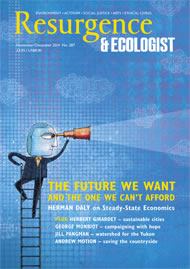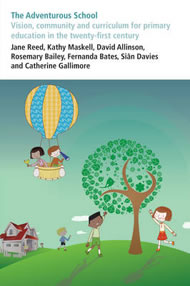This brave book is the story of five courageous and forward-thinking teachers and their eager, competent and creative pupils, who all responded to the challenge of forging a new vision for their schools. Jane Reed, the editor, is well known for her work in ecological education: inspired by the work of Fritjof Capra, she set up the first Ecoliteracy project in the UK in the 1990s, and since then she has played a leading part in the school-improvement movement of the early 21st century. She brought together senior teachers from three schools in different parts of England to embark on a five-year journey to create the adventurous school.
The three schools are very different and none is renowned for its work in environmental education. They are mainstream state primary schools whose pupils and parents reflect the multicultural and socio-economic make-up of England as a whole. A North London infant school, a rural primary school in Somerset, and a primary school in a northern industrial town were perhaps chosen to highlight the differences that exist in English society today as well as celebrating the often unnoticed and unsung daily efforts of those teachers who “re-inspire the wellsprings of public schooling”.
All three schools put learning at the heart of their vision for change. Hemmed in by the external constraints of the National Curriculum and Ofsted, and caught in the trap of a neoliberal ideology, nevertheless these schools have succeeded in reshaping their curriculum and pedagogy to become authentic learning communities – in other words adventurous schools. An adventurous school seeks out change and takes risks. It has the confidence to take the power to change things for the better, inspired by faith in its teachers as well as its pupils and their parents.
The teachers see their role as one of liberating their pupils from fear of failure, from compliance and conformity by enabling every child to have the experience of taking charge of his or her own learning. The old view of children as passive receptacles of information provided by the teacher has no place in the adventurous school. The children learn from first-hand experience, they learn about what is of interest to them, and they learn collaboratively in relationship with other children. The ethos is one of community, not competition, and the purpose is to empower a young learner to ask questions, see alternatives and make connections. The Gradgrind tradition is left behind as learning becomes fun, as children take on the role of “learning wizards”, sometimes wearing pointy hats and long cloaks of the Harry Potter variety. Learning wizards are a common feature in one of the three schools: these are children who have mastered the basic skills of learning: risk taking, asking relevant questions, taking responsibility for their own learning, learning from mistakes, and persevering when they encounter difficulties.
This view of learning is a far cry from the knowledge-based, didactic and teacher-centred learning that is still the norm for many schools, under governmental pressure to ‘perform’ according to Ofsted criteria. The astonishing achievement of these three schools is that they have been able to find ways around these constraints and put into practice their vision of learning. Over the five years that the teachers worked together they succeeded in bringing about what Fritjof Capra sees as the shift to transformative, community-based learning. As the children began to speak the new language of learning and share with their parents the kinds of activity that were taking place at school, the vision spread to the community outside and, in place of the old ‘ivory tower’ concept, people began to view school as a social enterprise educating the citizens of the future.
This book is infused with the excitement of venturing into the unknown. Children and adults have lived through the hazards of going against the grain, have resisted the temptations of a prescribed curriculum and tick-box learning to create an alternative paradigm of education. These personal accounts of the processes of change and transformation – and success – make for inspiring reading.








